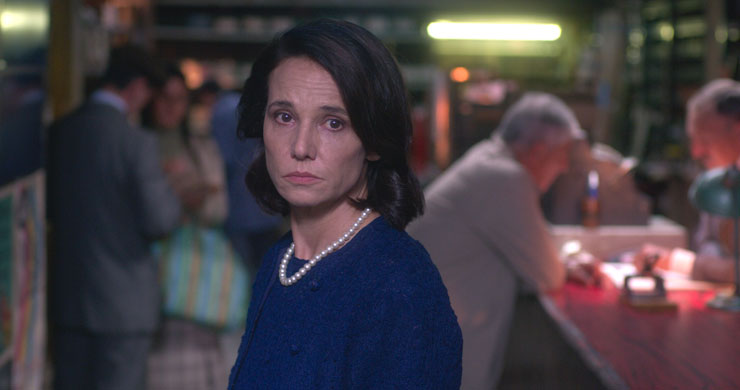
Aline Küppenheim as Carmen in a scene from "Chile '76." (Photo courtesy of Kino Lorber)
There's so much to do and too little time. A home renovation sounds like a cakewalk when you're not the one doing the grunt work, but you won't believe the planning that goes into it. So much shopping to take care of, so many moving parts to referee. Take, for instance, finding the ideal shade of salmon for that new coat of paint in the living room.
Carmen is busy making sure those paint cans she takes to her beach house, where a crew is hard at work bringing to fruition the makeover she's orchestrating, contain just the right hue. The 50-year-old still looks fabulous running her errands. After all, it's never a bad thing to look like you're living your best life. It's true in this day and age, and it was also the case 47 years ago.
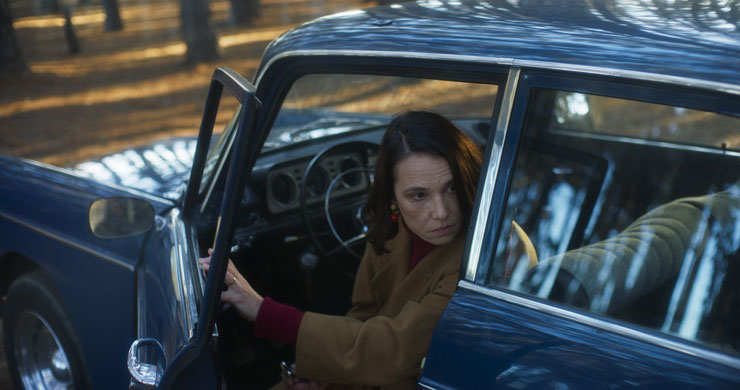
Aline Küppenheim as Carmen in a scene from "Chile '76." (Photo courtesy of Kino Lorber)
Then the screaming breaks Carmen's concentration. She was just done telling the employees at the shop that the paint color needed more blue. But what is this woman screeching about? Carmen looks up, perfectly coiffed hair, natty attire and a pearl necklace bringing it all together with European flair. The shouting stops, as the unmistakable sound of a car's hasty departure takes over. A man's remark that this is the third time in a week that this happens, whatever “this” is, barely registers. But the brown buckle shoe Carmen finds under her car some time later, when she walks back out onto the bustling Santiago street, does give her pause. Cinderella's glass slipper this is not.
Welcome to life under a dictatorship, vividly dramatized as a momentary wrinkle in an upper-middle-class homemaker's hectic itinerary. The military coup that put Augusto Pinochet in power is three years in the past when the new period drama “Chile '76” opens, but you wouldn't know it from the way its moneyed protagonist goes through her day, oblivious to the alarming uptick in people who vanish into thin air after some scary men barge into their homes.
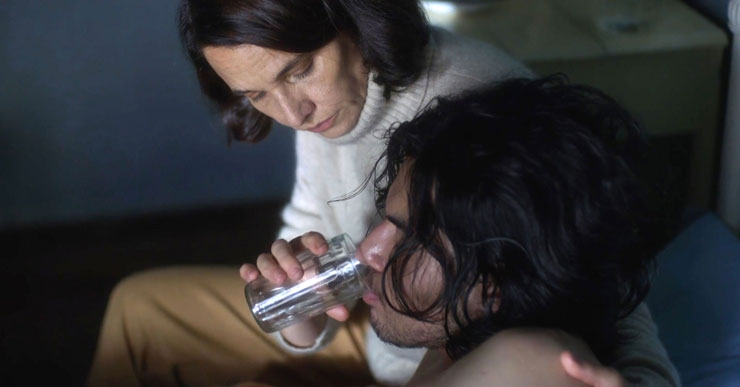
Aline Küppenheim as Carmen and Nicolás Sepúlveda as Elías in a scene from "Chile '76." (Photo courtesy of Kino Lorber)
But Carmen, played by Kristin Scott Thomas look-alike Aline Küppenheim (“A Fantastic Woman”), is about to have her eyes opened about the South American regime that rules with an iron grip outside her bubble of privilege, away from the family gatherings, designer clothes (bell bottoms!) and life of leisure, with some notable community service thrown in. She is also introduced to the underground forces striving to bring about change. The ones who at this juncture are losing the battle.
A favor from the family priest, Father Sánchez (Hugo Medina), leads Carmen to meet Elías (Nicolás Sepúlveda), a young man who was injured after stealing to put food on the table. Or so the good padre with the bushy eyebrows says when asking Carmen to nurse the patient back to health. Carmen, a former Red Cross volunteer who is married to a doctor, take one look at Elías, with his Jesus hair and nasty leg wound, and knows she's not dealing with a common criminal.
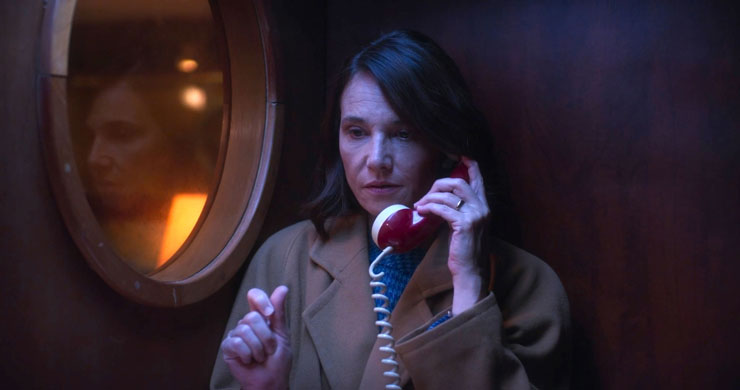
Aline Küppenheim as Carmen in a scene from "Chile '76." (Photo courtesy of Kino Lorber)
The pieces are all in place for a ripping yarn. You can't wait for director/co-screenwriter Manuela Martelli, here making her feature directing debut, to start turning the screws on Carmen, and the audience, as the character chooses to become involved in the efforts to help bring powerful, all-emcompassing evil to its knees.
And the filmmaker finds in Carmen an engrossing figure to navigate this minefield. The character is engaging because one senses true grit beneath the glamorous façade. This bourgeois housewife with two adult children and three grandkids has steadfast compassion and the urge to do the right thing coursing through her veins. Her imperfect attempts at helping the cause just make the character more interesting. Küppenheim's nuanced turn skillfully hits all these notes: Carmen's resolve and that sinking feeling she's in way over her head, meddling in affairs that are well beyond her control.
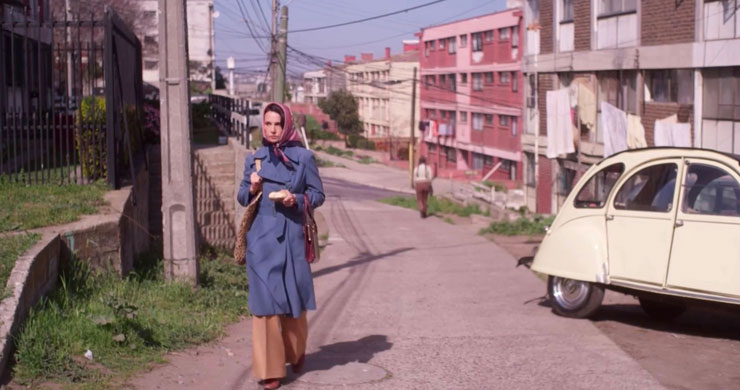
Aline Küppenheim as Carmen in a scene from "Chile '76." Photo courtesy of Kino Lorber.
Which makes it that much more dispiriting how “Chile '76” lets her down. Martelli, aided by solid production values (cinematography and production design are spot-on), successfully maps out Carmen's routine: her sleepless nights, her overreliance on her housekeeper, who is essentially a member of the family but is still the help, and more intriguing of all, a vaguely alluded to mental health episode in her past. The episodic structure of the film's first half fits this portrayal like a glove. But Martelli aims to change gears, to go beyond a character study and into thriller territory. We're supposed to feel an escalation in tension, a slow-burn progression as the walls close in.
It gives me zero pleasure to say the filmmaker is unable to pull off this shift. The film, originally titled “1976,” lurches from one scene to the next, occasionally inserting unsettling glimpses meant to hint at the horrors taking place in the South American country. But where is the menace, the encroaching dread and sense of impending doom? Largely MIA.
A shot of a car from a rearview mirror, awash in “Psycho” vibes, means little if its placement in a scene does little to make the viewer feel a character's increasing paranoia and the possibility she may be in real danger. Martelli tips her hat to Hitchcock and, more relevant here, Costa-Gavras, the Greek-French director (“Z,” 1982's “Missing”) who excelled at putting a human face on political unrest. Sadly, her execution falls short of an effective homage. She doesn't quite get there.
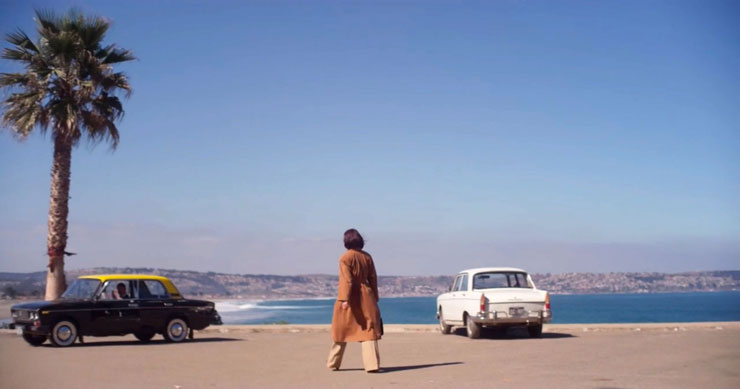
Aline Küppenheim as Carmen in a scene from "Chile '76." (Photo courtesy of Kino Lorber)
Too often, Martelli lets an ominous score by Mariá Portugal do the heavy lifting in trying to keep viewers off-balance. But the music is so obtrusive, at times sounding like something from a schlocky horror movie, that the effect it has is making “Chile '76” more of a chore to sit through, even at just 95 minutes long. It goes from absorbing to tedious before it's over.
Martelli wants to convey Carmen's ambivalence, her growing awareness and the uncertainty of what her actions will bring. But that's not the way “Chile '76” plays. It shepherds viewers to a resolution that ought to be affecting, but because it's so tidy and airtight, fails to leave much of an impression. It leaves you thinking, not about what you saw, but about the movie that could have been. About how one well-to-do woman's political awakening amounts to a hill of beans in this crazy world.
“Chile '76” opens Friday at the Coral Gables Art Cinema and Cinema Paradiso Hollywood. It played as part of Directors' Fortnight during the 2022 Cannes Film Festival.




